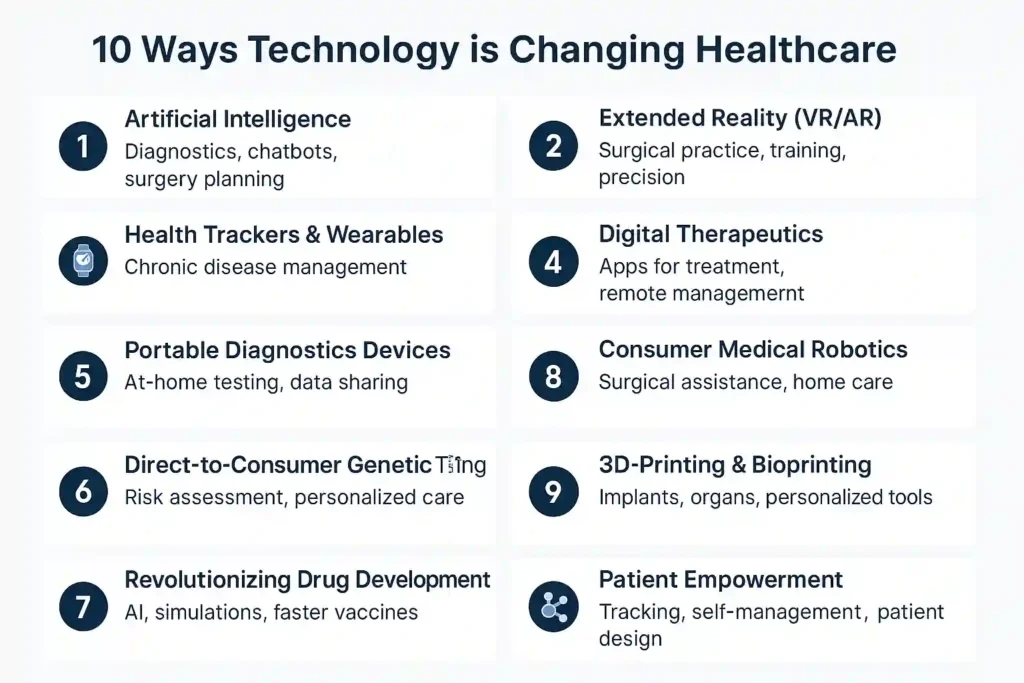Key Takeaways
- Technology in healthcare is making care faster, easier, and more personal.
- From AI to 3D printing, tools are helping doctors and patients in powerful ways.
- The impact of technology on healthcare is huge, improving everything from diagnosis to treatment.
- These changes are shaping the future of healthcare for the better.
10 Ways Technology is Changing Healthcare

Table of Contents
ToggleTechnology in healthcare is changing the entire experience of being a patient or a provider. From how we talk to doctors, to how diseases are found, treated, and even prevented, these changes are happening faster than ever.
In this blog, we’ll explore ten major ways that health technology is reshaping care, making it faster, smarter, and more personal for everyone. Let’s break it down.
1. Artificial Intelligence
Artificial intelligence in healthcare is helping doctors diagnose diseases earlier. AI can scan medical images like X-rays or MRIs and find problems a human eye might miss. It can predict which patients need care fast.
Chatbots answer health questions in seconds. Some hospitals use AI to plan surgeries better. This is one of the most powerful healthcare technology trends today. It makes decisions smarter and treatments safer.
The role of AI in healthcare is growing every day. This is not the future, it’s already changing care.
2. Extended Reality
This includes Virtual Reality (VR) and Augmented Reality (AR). It might sound like video games, but it’s much more.
VR is helping doctors practice surgeries without touching a real body. AR is used in the operation room to show organs in 3D over the patient’s body. Students can now learn better. Doctors can now treat with more accuracy.
Extended reality is improving patient care and changing how professionals are trained. It’s another key part of the digital transformation in healthcare.
3. Health Trackers, Wearables, and Sensors
Fitness bands, smartwatches, and even smart rings are now part of our lives. These devices track our steps, sleep, heart rate, and more.
But they do more than count steps.
Some can alert doctors if your heartbeat is not normal. Some warn you about falling blood sugar. These wearable health devices are helping patients manage chronic diseases from home.
This is technology in the healthcare industry, right on your wrist.
4. Portable Diagnostics Devices
What if you could check your blood pressure, sugar, or even your lungs at home?
Now you can. Small devices let people do medical tests from their couch. Some connect with smartphones. The data is shared instantly with doctors.
These tools are fast, cheap, and help catch problems early. In areas with no hospitals nearby, they’re lifesavers.
This shift is a huge transformation in healthcare, helping people everywhere get care.
5. Direct-to-Consumer Genetic Testing
If you want to know if you’re at risk for diabetes, cancer, or heart disease, you can order a test online, send your saliva, and get the results at home.
These tests can help people understand their risks and act early. While they don’t replace a doctor’s advice, they empower people to learn more about their health.
This is one of the growing healthcare technology trends. And it’s changing how we think about our own bodies.
6. Revolutionizing Drug Development
Making a new drug used to take over 10 years. Today, health tech advancements are cutting that time down.
AI helps researchers find what molecules might work. Big data helps spot what kind of treatments are needed most. Simulations test side effects before human trials begin.
During the COVID-19 crisis, technology helped speed up vaccine creation. That’s how the role of AI in healthcare is changing the future.
The results are faster, safer, and more targeted drugs.
7. Digital Therapeutics
Digital therapeutics are apps that treat diseases. They help with problems like anxiety, ADHD, or diabetes. These aren’t just reminders. They include real treatments approved by doctors.
One app may guide patients through breathing exercises. Another helps track blood sugar. This is part of smart healthcare systems that mix tech with real medical care.
Patients follow their own plans from home. These tools show how health technology is now part of everyday treatment, not just support.
8. Consumer Medical Robotics
We’re not talking about robot doctors. But small robots can help in big ways.
There are robots that assist during surgeries, helping doctors make precise moves. Others help older adults at home by reminding them to take medicine or helping with simple tasks.
Robots also help in labs, doing tasks like preparing test tubes faster than humans.
Robotics in medicine is not about replacing humans, it’s about support, safety, and speed.
9. 3D-Printing & Bioprinting
Need a bone? A dental implant? A custom hearing aid? 3D printers can make them.
Bioprinters go even further; they can create layers of skin, or parts of organs, using living cells.
This means less waiting for organs. And it means personalized tools that fit perfectly.
When body parts match exactly, healing is faster. This is one of the most exciting medical technology innovations and a clear sign of the future of healthcare.
10. Patient Empowerment and Patient Design
The biggest change is patients are no longer just “receivers” of care.
With apps, trackers, and online tools, people now manage their own health. They track symptoms, learn from test results, and even suggest changes to their treatment plans.
Some hospitals now involve patients when designing health services. It’s called “patient design,” and it’s working.
This is the real impact of technology on healthcare: giving people control, and making care personal.
Technology in Healthcare: Food for Thought
All of these tools are helpful. But they also bring questions.
How do we protect privacy when so much data is shared? Can people in rural or poor areas access this technology? Will older people find these tools easy to use?
Also, doctors must learn how to use these systems. That takes time and training. Not all clinics can afford them yet.
Still, the good outweighs the bad. Technology in healthcare is here to stay. It will keep growing. And it will keep improving how we live.
As big data in healthcare continues to grow, we’ll see even more changes ahead.
FAQs
How has technology changed health care?
Technology in healthcare has made care faster, safer, and more personal. Patients can talk to doctors online, track their health at home, and get early diagnoses using AI tools and remote monitoring.
What technology will have the biggest impact on healthcare?
Artificial intelligence in healthcare will likely make the biggest impact. It improves diagnosis, treatment planning, and drug research. It also saves time for doctors and supports better decision-making for patients and providers.
How will AI change healthcare?
AI helps doctors detect diseases early, review test results faster, and create better treatment plans. The role of AI in healthcare is growing, making medical care smarter, quicker, and more accurate.
Which technology is used in healthcare?
Common tools include wearable health devices, AI, electronic health records (EHR), robots, and mobile apps. These tools are part of the fast-growing technology in the healthcare industry, improving care for both patients and doctors.
What is the biggest technology challenge facing healthcare today?
The main challenges include data privacy, high costs, and access in rural areas. Even with health tech advancements, not everyone benefits equally from the digital transformation in healthcare due to these ongoing barriers.
How does technology impact the role of healthcare providers?
Technology helps doctors work faster, track patients remotely, and use real-time data for decisions. But it also requires new training. This shift is a key part of the transformation in healthcare today.

This article is medically reviewed by Dr. Chandril Chugh, Board-Certified Neurologist, providing expert insights and reliable health information.
Dr. Chandril Chugh is a U.S.-trained neurologist with over a decade of experience. Known for his compassionate care, he specializes in treating neurological conditions such as migraines, epilepsy, and Parkinson’s disease. Dr. Chugh is highly regarded for his patient-centered approach and dedication to providing personalized care.








